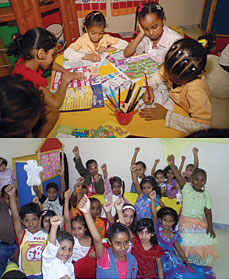JEDDAH, 2 May 2008 — Driven by her passion to eradicate poverty, Sadiyah Al-Wafi is voluntarily reaching out to the people in Gholail district — a poor Jeddah suburb in the south of the city — and taking steps to improve their quality of life.
In the same year that Muhammad Yunus and Garmeen Bank were awarded the Nobel Peace Prize, Al-Wafi, planning and developing manager of development projects at Tamkeen, brought the Garmeen Bank’s model to Gholail.
“I wanted to help transform poor families into productive members of society. I tailored the bank’s idea to meet the needs of the Saudi people,” said Al-Wafi. “Taking the Garmeen Bank International Training made me truly realize the meaning and value of community service and corporate social responsibility (CSR). I now dream of working toward a poverty-free society.”
Al-Wafi started a small consultancy office for charity projects with five of her friends and undertook a comprehensive study of 50 families in the district. The study included a field survey, crime rate, statistics on widows and divorcees, the number of people who did not have ID cards, and a questionnaire about families’ financial, economic, health and educational situation. The data they collated was then analyzed.
“Men, women and children were extremely responsive and cooperative. I made them feel they had a role to play in society by involving them. I earned their trust and from there I started organizing lectures, meetings and training courses inside their homes,” said Al-Wafi.
Jabriyah, 30, is one of the people who attended Al-Wafi’s training seminars on how to develop personally and professionally. Jabriyah never finished high school and, until 18 months ago, was financially strapped.
“I took a hairstyling and makeup training course for two months with Sadiyah. I enjoyed it so much and decided to take a loan to start my own beauty salon in Gholail,” she said.
Al-Wafi provided Jabriyah and four of her friends with a SR13,000 loan for the project. At first Jabriyah said that everyone was hesitant and concerned about the results, but soon business at the salon, called Anti Al-Ajmal (You’re the Prettiest), picked up.
“We printed brochures and distributed them. Sadiyah also helped us in promoting our work in the neighborhood,” said Jabriyah. “I pay back my loan on a monthly basis. Sometimes I pay SR1,000 and sometimes SR500. Sadiyah is very cooperative, understanding and patient with me.”
Feeling emotional, Jabriyah told Arab News that it is rare for people to offer free training courses, loans and ideas for projects. Jabriyah has great ambitions now; her dream is to open a bigger and more advanced beauty salon. Al-Wafi usually asks women who apply for loans about the projects they have in mind. Prior to lending them money, the women are asked to undergo a free training course that helps them develop a better idea of the project they wish to undertake.
“After that, I undertake a feasibility study. Loans are given to participants based on the results of the study,” said Al-Wafi. “I try to engage the women by listening to their thoughts and discussing their ideas. It creates a sense of discipline when you place that trust in them, and make them aware of the responsibility of having to work and pay back their debt.”
One of the programs Al-Wafi designed for the residents of Gholail was called “Our Children.” She met a group of children three times a week for three hours to teach them English and computer skills, and take them on field trips while incorporating behavior modification principles to improve discipline.
“I also created another program called The Arabic Woman Speaking. I met mothers, trained them how to deal with their children. We also gave them classes on illiteracy eradication and Qur’an memorization,” said Al-Wafi.
As an accredited trainer from the British Academy, Al-Wafi worked for almost two years pursuing her own initiative of training and helping people in the Gholail neighborhood. She then met Asya Al-Ashaikh, executive director of Tamkeen.
“When I met Sadiyah I found that there was a huge chance to unite our efforts and come up with one product. She helped 50 poor families in Gholail and transformed them into productive members of the society through her program. From there, I started to know her work better, understand her mechanism and the people she works with. I found that the changes she’s achieved are the most successful way for development,” said Al-Ashaikh.
Al-Ashaikh said that her goal is to embrace Al-Wafi’s projects under the umbrella of Tamkeen, which is the first company to offer professional CSR in the country. “Our goal is to provide all services to design, implement and supervise the programs,” she said.
“Our culture and environment don’t allow outsiders to support our developmental programs, so there was a vacuum in the market to have a company that provides CSR products.”
Tamkeen specializes in the field of human, social and economic development. The name is derived from the Arabic verb “to enable” and “to empower the individual, society and community to develop and grow in a most productive manner.”


